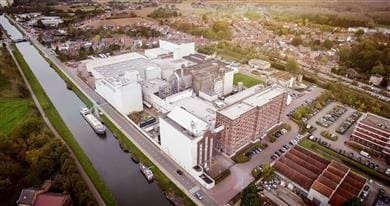BENEO, a world leader in healthy ingredients, has announced a 50 percent production capacity increase at its Wijgmaal rice starch facility. A two-stage expansion process valued at €50 million, will lead to increased capacity by March 2022. The facility, which currently employs 180 people, will add up to 20 full-time positions during the course of the expansion, as well as offer further work to maintenance and engineering contractors in the vicinity. The plant has a proud tradition of 160 years in the Wijgmaal area.
BENEO forecasts that the growing demand for natural and clean label products, in applications such as coatings, will intensify in major existing markets, including Europe and the Americas. Expanding the Wijgmaal facility was a logical decision for the global company, considering the existing infrastructure and available land at the iconic plant.
Roland Vanhoegaerden, Operations Managing Director Speciality Rice Ingredients at BENEO notes that the nature of the ingredients business is one of long-term thinking and economic resilience. “We fundamentally believe in the value of this investment, with demand for rice starch coming from both natural and organic growth, as well as from new projects and applications. One of the key reasons for our confidence is the ‘clean label’ trend, where food manufacturers are moving away from artificial additives and replacing them with natural alternatives, such as rice starch.”
Rice starch is capable of filling up all of the micropores on the surface of coatings due to its very fine particle size. This so-called “smoothing effect” is especially beneficial for confectionery manufacturers during the production process, since it ensures a stable result where edges do not crack or splinter. Additionally, rice starch allows for the preservation of a brilliant white colour for months.
Since January 1, 2020, titanium dioxide, which is used to fill microscopic irregularities in coatings, is no longer permitted for use in food products in France. There are expectations that other EU markets may follow the country in banning the additive. “We are already seeing some major companies looking at rice starch and we will soon have a much larger capacity in place to answer this demand,” Vanhoegaerden explains.
Rice starch production consists of several phases: rice cleaning, soaking, milling, sieving, separation, dewatering, and finally drying. BENEO’s investment at the Wijgmaal facilities will increase the number of production lines from two to three. The first phase of the BENEO investment will take place at the tail-end of the production process for existing lines. The installation of a third drier and dewatering line allows the company to reduce bottlenecks and further increase efficiency. The second expansion phase will involve the front-end of the production process, starting from soaking through to the separation of the starch from the proteins in the valorisation step.
BENEO has been significantly investing in the Wijgmaal facility in recent years, to make it a frontrunner in sustainability. A new docking station investment means that the company can now accept two barges at its plant, rather than one. As a result, two-thirds of rice raw material is now received by barge and just one-third by truck. “The impact is on cost saving, but also on the environment, due to lower carbon emissions and a reduction in traffic. Our factory is in the middle of an urban area and by increasing barge use, we can reduce congestion and noise levels in the neighbourhood,” Vanhoegaerden notes.

